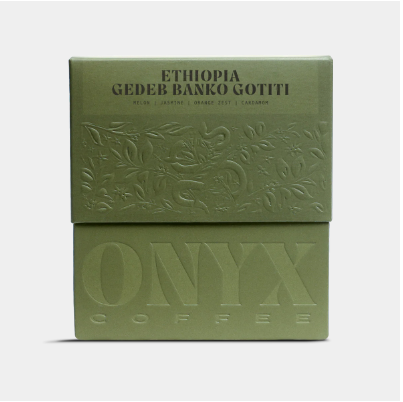
About this Coffee
Washed coffees from the Gedeb region are often shining examples of why Ethiopia is the north star for processing and cultivation. This offering from Banko Gotiti fits the mold of the archetype of washed coffees, reminding us of fresh melon, delicate jasmine, finishing with lasting orange and cardamom. As with most washed Ethiopian offerings, we thoroughly enjoy these coffees for their utility both as espresso or filter brews
Inside Baseball: (Metaphor) In American slang, the term inside baseball refers to the minutiae and detailed inner workings of a system that are only interesting to, or appreciated by, experts, insiders, and aficionados.
Each season, we earmark a bit of our Ethiopian coffee position such that it allows for us to have spontaneous purchasing from many folks that we work with. Within the coffee buying industry, this is known as a spot purchase. Within a given procurement system, allowing for a certain amount of random chance typically has one or two outcomes: the worst being that you have earmarked some volume which is fulfilled by an objectively worse option either by price, or by quality standards. The best outcome of this chance is that your friend Michael Adinew at Cafe Hilm calls you up, and you find a really delicious spot offering like this one. Sometimes, it is that simple.
BANKO GOTITI
We have had the pleasure of purchasing coffee from Banko Gotiti on several occasions throughout the seasons. This exquisite lot has found its way to us through the kind efforts of our friend Michael Adinew and Testi Coffee. The allure of Banko Gotiti’s coffees lies in their distinctive cup profile, which we consider to be a convergence of numerous unique factors in coffee cultivation. One of the standout features is the use of indigenous coffee varieties, which contribute to the coffee’s exceptional flavor. Additionally, the coffee is cultivated at an incredibly high elevation, further enhancing their quality. This combination gives rise to a cup that boasts a dense and intricate sweetness, complemented by the delicate floral notes characteristic of our favorite Ethiopian coffees.
The origins of the Banko Gotiti cooperative can be traced back to 2012 when it branched off from the larger Worka Cooperative. Despite being smaller in size, the Banko Gotiti cooperative takes great pride in its meticulous cherry selection and processing methods. This meticulous approach is evident in the superior quality and flavor of the coffee they produce.
The cooperative’s name is derived from its close proximity to the town of Banko Gotiti, adding a touch of local charm to the coffee’s origin. We continue to be impressed by the consistent excellence of the coffees produced by the Banko Gotiti cooperative and look forward to more exciting discoveries in the future.
WASHED PROCESSED COFFEES
The washed process begins with coffee cherries delivered to the washing station, both from the primary market or from farmers bringing their coffee directly to the mill. The cherries are inspected, and an initial quick round of hand-sorting separates the defective coffees before placing them into the hopper. They are then funneled to the depulper, which removes the fruit from the seeds (beans). After that phase is done, the coffee is fermented underwater for approximately 12-36 hours. During this fermentation, a microbial de-mucilagation takes place, which allows the outer fruit and pectin layer to break down, making the coffee easier to dry. This phase also crucially alters the organic acids within the coffee, as sugars and organic acids are transformed, with the best washed coffees maintaining their complex fruit esters. Once the fermentation is complete, the parchment is emptied into the washing channels, where it is agitated with rakes to remove the last of the fruit layer. During this step, the water is refreshed to ensure it’s capability of separating the fruit layer from the seed. Once the washing is complete, the coffee is taken to the raised drying tables for sun drying.